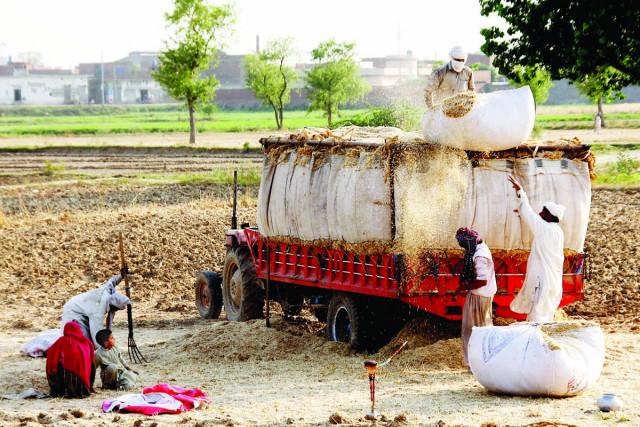Government to miss wheat production target by a million tons
Wheat shortage and price inflation expected to hit the country in December.

Farmers: Bundles of wheat are being loaded onto a tractor near Jallo Mor. PHOTO: ABID NAWAZ/EXPRESS
With the expectations of missing the target for the fifth consecutive year, the fear of wheat shortage and high flour price is on, and this is expected to hit the country in December or early 2014.
With an annual population growth of 2.5%, Pakistan’s population had shown a growth of 12.5% in the last five years and for the same period the government has failed to achieve the stagnant wheat production targets, said Ibrahim Mughal, chairman of Agri Forum Pakistan while speaking to The Express Tribune. Keeping in mind the carried forward stock of 0.5 million tons, it will be tough for authorities to meet wheat demands for the whole year.

Pakistan requires 26 million tons of wheat to cater its annual consumption, of which 23 million tons is consumed as food, 1.5 million tons for seeding and around one and half million tons is wasted during the whole process. In an optimistic scenario, if wheat production clocks in at 24 million tons this year, then Pakistan will have 24.5 million tons available for fiscal 2013-14 after adding the carryover stock.
“The role of middlemen this year will be quite disturbing, either they will purchase wheat from growers to sell it to government-regulated food departments where they will sell it for Rs1,200 per maund or will smuggle it to Afghanistan or Iran where they can make higher profits,” said Mughal. Internationally, a 40 kilogramme bag will fetch a price of Rs1,469, the price difference makes smuggling attractive even after deducting transportation charges, he added. Iran is always facing food scarcity due to international sanctions.
If they become successful at achieving procurement targets, it will still leave around 67% of the total production lying around to be bought by the middlemen, flour mills or other growers, who will want to buy wheat to fulfil their consumption needs.
To curb smuggling, Director Food Punjab Captain Usman said, “If we end our drive by May 15, only then the middlemen will crash the current bullish wheat market and the ultimate disadvantaged party will be the grower.” “We will remain in the market for the next 45 days to ensure this does not happen,” he added.
Published in The Express Tribune, May 3rd, 2013.
Like Business on Facebook to stay informed and join in the conversation.



















COMMENTS
Comments are moderated and generally will be posted if they are on-topic and not abusive.
For more information, please see our Comments FAQ